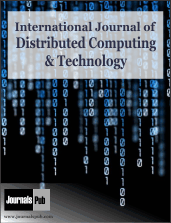Editor Overview
IJDCT maintains an Editorial Board of practicing researchers from around the world, to ensure manuscripts are handled by editors who are experts in the field of study.
Publisher
JournalsPubAn Imprint of Dhruv Infosystems Pvt Ltd
A-118, 1st Floor, Sector-63, Noida, U.P. India,Pin-201301
E-mail: [email protected]
(Tel):
(Mob) (+91) 9810078958, +919667725932
Focus and Scope

About the Journal
International Journal of Distributed Computing and Technology is a peer-reviewed journal that accepts original research article and review papers pertaining to the scope of the journal. The aim of the journal is to create break free communication link between the research communities.
All contributions to the journal are rigorously refereed and are selected on the basis of quality and originality of the work. The journal publishes the most significant new research papers or any other original contribution in the form of reviews and reports on new concepts in all areas pertaining to its scope and research being done in the world, thus ensuring its scientific priority and significance.
Focus and Scope
-
Decentralized computing: cloud computing, P2P decentralized computing protocol, decentralized reputation calculation,co-utile reputation,co-utile peer-to-peer decentralized computing, federated learning, outsourcing, decentralized mobile computing network, multi-robot systems operations, fully decentralized operations, complex collective computations, collective turns, collective harvesting, self-healing multi-robot systems, swarm robotics systems, algebraic operations, swarming paradigm, collective mapping, multiple robots, collective action, collective animal behaviors, novel collective computing framework, edge computing, basic computational tasks.
-
Distributed algorithmic mechanism design: algorithmic mechanism design, static load balancing, distributed systems, computational grids, large-scale computing problems, geographically distributed resources, resource allocation algorithm, protocol designing, game theory, Algorithm design and analysis, Load management, Cost accounting, Distributed computing, Grid computing, Protocols, Game theory, Large-scale systems, Resource management, Degradation.
-
Distributed cache: distributed cache management architecture, Internet traffic, Browser caches, World Wide Web, Internet applications, traffic volume, social networking, file hosting, video streaming sites, Web content, reliability problems, scaling problems, congested proxy servers, hierarchical architecture, distributed architecture, proxy cache server.
-
Distributed operating system: generic operating systems,system-aware timing analysis, static timing analysis, real-time operating systems, generically implemented services,system-context-specific knowledge, overly pessimistic analysis, SWAN, parametric source-level annotation language, analysis pessimism, real-world flight-control system, generically implemented system, timing analysis tools,system-wide, WCET analyses framework.
-
Parallel programming: high-level data-parallel programming, Promoter, scientific applications, parallel platform, flexible programming environment, hybrid system, two-level approach, flexible programming, language model, communication structures, programming model, runtime system.
-
Distributed sensor networks: Target tracking, Wireless application protocol, Wireless sensor networks, Clustering algorithms, Distributed computing, Spine, Computer networks, Concurrent computing, Partitioning algorithms, Trajectory, Wireless sensor networks, Event detection, Robot kinematic, Robot sensing systems, Partitioning algorithms, Computer networks, Distributed computing, Interference, Surveillance, Target tracking.
-
Optical computing: byte-based computing functions, LDPC coding, Galois field,all-optical FFT, Mach-Zehnder interferometer-based multiplier, XOR gates, SOA,all-optical linear block decoding,all-optical linear block encoding,all-optical error correction, PIC, photonic integrated circuits, optical processing, reliability issues, temperature sensitivity, O-E-O conversions, NOC, photonic networks-on-chips, optical transmission systems, parallel computing, optical communications, optical signal processing.
Open Access Statement
IJDCT is an open-access (OA) publication which provides immediate open access to its content on the principle that making research freely available to the public supports a greater global exchange of knowledge. All published works will be available to a worldwide audience, free, immediately upon publication. Publication in the journal is subject to payment of an article processing charge (APC). The APC serves to support the journal and ensures that articles are freely accessible online in perpetuity under a Creative Commons licenses.
Publication Ethics Statement
IJDCT fully adhere to Code of Conduct of Publication Ethics (COPE) and to its Best Practice Guidelines. The Editorial Team enforces a rigorous peer-review process with strict ethical policies and standards to ensure the addition of high-quality scientific studies to the field of scholarly publication. In cases where ctit becomes aware of ethical issues, it is committed to investigating and taking necessary actions to maintain the integrity of the literature and ensure the safety of research participants. Click here to read more about the Research & Publication virtue ethics
Content Disclaimer
All IJDCT the information’s, opinions, and views mentioned here represents the authors and the contributions of the articles. Publication of articles, advertisements, or product information does not constitute endorsement or approval by the journal. cannot be help responsible for any error or consequences while using the information updated in this journal. Although every effort is done by ctit to see that there’s no any inaccurate data, misleading data, opinion or statement within the journal, the data and opinions appearing in the articles are the responsibility of the contributors concerned.



